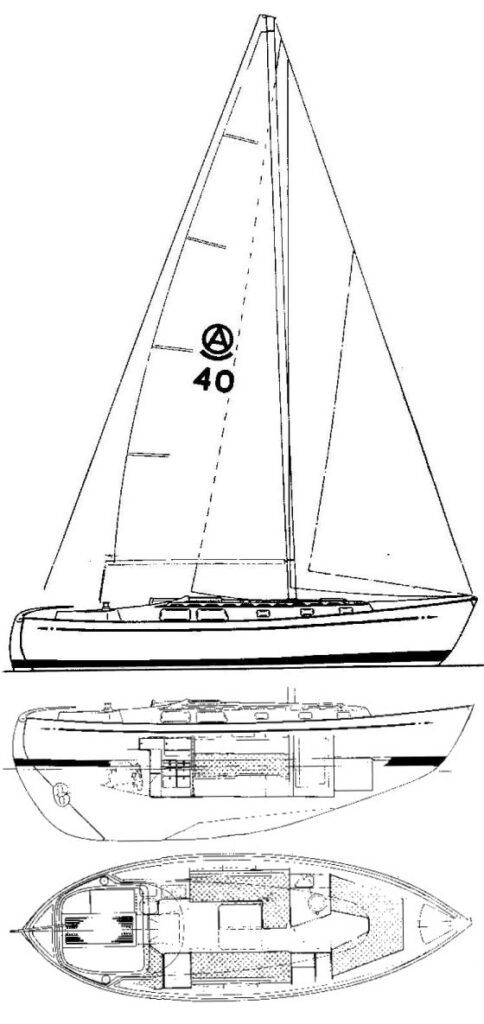The Amigo 40 is a sturdy masthead sloop that represents the Swedish boatbuilding tradition of robust and practical cruising vessels. With an original wooden version appearing in 1961, fiberglass production of the Amigo 40 commenced in the 1970s and continued into the early 1980s by Arksunds Batbyggeri Amigo Yachts. Designed by the Swedish maritime architect Carl Andersson, with some sources also crediting Olle Enderlein, this 30-foot cruiser earned a reputation in the sailing community as a dependable and seaworthy sailboat, well-suited for both coastal cruising and more ambitious offshore passages.
Amigo 40 Information, Review, Specs

- Make
- Model
- Number Built
- 48
- Production Year(s)
- 1961 - ??
The lineage of the Amigo 40 stretches back to 1961 with the construction of the original wooden vessel. However, it was in the 1970s that Amigo Yachts, known for their fiberglass construction, began producing the Amigo 40 in this more modern material, with records indicating hulls being built as late as 1979. Some sources suggest fiberglass production began around 1982 for this model. Designed by Carl Andersson, the Amigo 40 embodies a design philosophy focused on stability and directional control. It features a long keel, a hallmark that provides superior directional stability compared to boats with fin keels. Its distinctive "spitzgatter" canoe stern with a transom-hung rudder further emphasizes its heavy displacement, full-keel cruiser identity. Amigo Yachts, under Arne Arksunds, consistently prioritized practicality and seaworthiness across their range, aligning perfectly with the Amigo 40's design for comfortable family cruising and capable offshore adventures.
Sailing Performance and Handling
The Amigo 40's design ratios paint a clear picture of its intended performance characteristics. With a Sail Area to Displacement (SA/D) ratio of approximately 12.8, the Amigo 40 is categorized as a heavy displacement cruiser. This indicates that while it may not be a light-air speed demon, it is designed for comfortable and stable progress, especially in stronger winds. Its high Ballast to Displacement ratio of around 0.47, combined with a heavy displacement of approximately 12,125 pounds, contributes significantly to its impressive stiffness and excellent righting capability. This translates to a boat that stands up well to a breeze, inspiring confidence in challenging conditions. The Displacement to Length (D/L) ratio, calculated at approximately 299, further confirms its robust and traditional heavy cruiser classification. With a theoretical hull speed of 6.87 knots, the Amigo 40 is well-suited for predictable and steady passages. Owners and reviewers often describe the Amigo 40 as a very stable and stiff vessel, making it well-suited for bluewater cruising due to its inherent stability and directional control afforded by its long keel.
Accommodations and Layout
While detailed interior diagrams are not widely available, the Amigo 40 is known for a "spacy hull design," which suggests a focus on interior volume for comfort. Typical layouts feature accommodations for 5-6 berths, making it suitable for families or extended cruising. Essential cruising amenities, including a galley and a substantial freshwater capacity of 53 gallons, are integrated into the design. Given Amigo Yachts' reputation for robust construction, the interior is likely finished with durable materials, emphasizing practicality and longevity over intricate decorative elements, consistent with classic Swedish cruising yacht design.
Measurements
Construction & Hull
- Construction Material
- Fiberglass (Solid)
- Hull Type
- Monohull Sailboat
- Keel Type
- Long
- Rudder
- 1x Transom-Hung
- Ballast
- 5732 lbs (Iron)
- Displacement
- 12125 lbs
- Water Capacity
- 53 gal
- Fuel Capacity
- 21 gal
Engine
- Engine Make
- Volvo Penta
- Engine Model
- MD2003
- Engine Type
- —
- Engine HP
- —
- Engine Count
- 1
- Drive Type
- —
- Fuel Type
- Diesel
Rig & Sails
- Rig Type
- Masthead Sloop
- P (Main Luff)
- -
- E (Main Foot)
- -
- I (Foretriangle Height)
- -
- J (Foretriangle Base)
- -
- Forestay Length (est)
- -
- Main Sail Area
- -
- Foretriangle Sail Area
- -
- Total Sail Area (Reported)
- 425 sqft
- Total Sail Area (Calc)
- -
Dimensions
- LOA
- 30.71 ft
- LWL
- 26.25 ft
- Beam
- 10.01 ft
- Draft
- 4.92 ft
- Max Headroom
- -
- Air Draft
- -
Calculations
- Hull Speed
- 6.87 kn
- Pounds per Inch Immersion
- 938.88